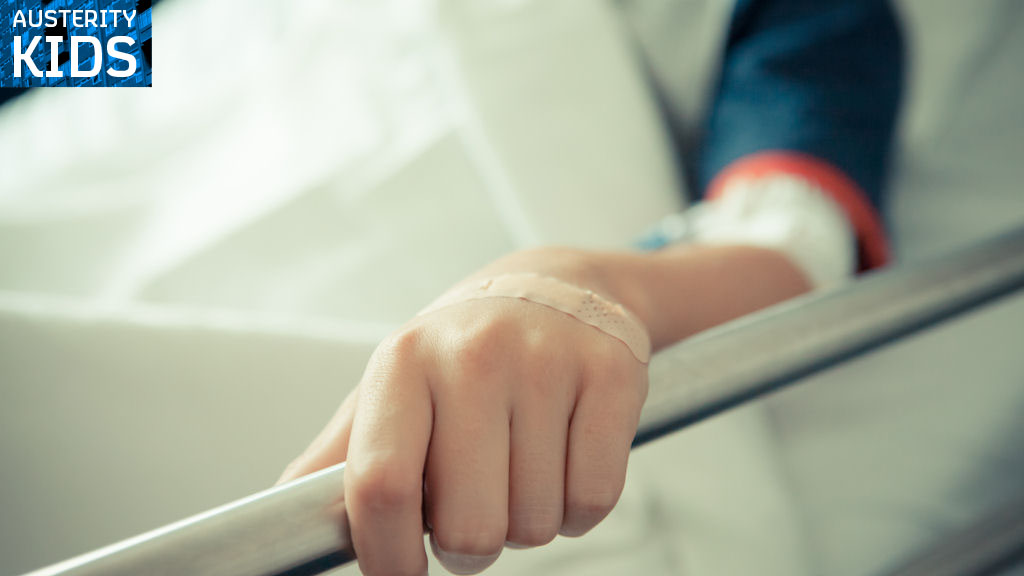Portugal health crisis: ‘We do not even have scrubs’
Portuguese medical student Francisco Ribeiro Mourao tells Channel 4 News’s Austerity Kids project that cuts to his country’s health system are hurting patients – and threatening future care.

Francisco Mourao is a 23-year-old medical student in Porto, Portugal.
He is also the president of the Portuguese Medical Students’ International Committee. And he has searing first-hand experience of how the unfolding crisis in the Portuguese health system is hitting patients.
“One of the things that we see the most at the hospital is that lots of patients don’t have money to buy their medications,” he told Channel 4 News. “It happens every single day.”
He says patients are also missing appointments because they cannot afford to pay for them, and even when they get to hospital, doctors are often forced to send people away as quickly as possible because they do not have the available funds to admit them.
Patients don’t have money to buy their medications. It happens every single day. Francisco Mourao
Pharmacies are also struggling – many simply do not have the money to buy expensive medicines so some of the shelves are empty, leaving patients unable to access life-saving drugs.
There have also been reports of lower-quality, cheaper swabs being used which are falling apart in patients’ wounds, and other shortfalls in hospitals.
“Hospitals are also struggling sometimes with lack of materials, or are working with materials with lower-quality, not providing the service they used to provide or the quality they used to provide,” said Mr Mourao, who recorded the video below to tell his story of growing up in struggling Europe in the wake of the eurozone crisis as part of the Channel 4 News Austerity Kids project.
Portugal is one of the most severely-hit austerity nations in the eurozone. To keep the troika of the European Union, the International Monetary Fund and the European Central Bank onside, earlier this year Prime Minister Pedro Passos Coelho pledged huge cuts to public sector spending – not least the health service. It is not the first time either – 13bn euros have already been wiped off the national budget since 2008.
Critics say the cuts to the health service have already gone too far, pointing out that in 2012 the health service made savings of 845m euros – far more than the 550m euros ordered by the troika in the bailout conditions.
As a result, the Portuguese Nurses Union estimates that 1 million Portuguese people avoided going to see a doctor last year, and 500,000 went without treatment.
Portugal does have a national health service, which used to be free or close to free at the point of use. That all changed since the eurozone crisis, with hospitals closing and nominal contributions for services like emergency medicine reaching up to 50 euros – at a time when the population can least afford it.
Rising costs
The Ministry of Health said: “The NHS has allowed a huge improvement in the quality of life of the Portuguese in its 30 years of existence. However, rising costs – far above the growth of the economy – threaten the quality and universality of the NHS.
“To ensure this quality and universality, the government has to reduce spending. It is, therefore, essential that the available resources are better utilised, avoiding waste, that is, improving management, transparency and accountability for the use of money from citizens.”
We don’t have the scrubs to go into the operation room so we just stay outside. And it happens every single day. Francisco Mourao
But unless something changes, Mr Mourao and many of his compatriots are even more worried about the future. Cuts to the service mean that many medicine graduates cannot find jobs – and those who are still training are facing huge gaps in what they can learn as a result of cuts, even missing out on surgery observations because of cuts to laundry budgets.
How can students become the surgeons, GPs and consultants of the future in Portugal, he argues, if they cannot even get into the operating theatres today?
“In my university, during our medicine [course] we have to go to operations to see surgery. What has happened because they are cutting costs in the laundry, it means that we don’t have the scrubs to go into the operation room so we just stay outside. And it happens every single day,” he said.
Get involved in Austerity Kids
- Are you aged between 15-25?
- Do you live in Spain, Greece, Italy, Ireland, Portugal, Cyprus, Romania, the UK, Germany or France?
- Has your life been hit by austerity Europe? For example, you or someone in your family might have lost your job; you may have had to turn to food banks to help feed your family; or you might have taken part in or even organised anti-austerity protests.
- Are you up for telling us your story over the next few months in text, film, pictures and audio?
Get in touch: email us on austeritykids@itn.co.uk, tweet us @austeritykids or with the hashtag #austeritykids, or post on our Facebook or Google+ pages.
-
Latest news
-
Tim Booth of the band James’ on agism in music, topping the charts and AI6m

-
As India goes to the polls in the world’s largest election – what do British-Indians think?6m

-
Tees Valley: Meet the candidates in one of the biggest contests coming up in May’s local elections4m

-
Keir Starmer says public sector reform will be a struggle7m

-
Nicola Sturgeon’s husband Peter Murrell charged with embezzlement of funds from SNP1m

-




